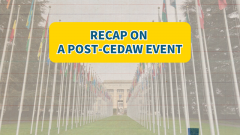Self-determination of the Ryukyu/Okinawa and accountability in Sri Lanka (HRC29, 2015, OS)
June 24, 2015
IMADR statement on “Self-determination of the Ryukyu/Okinawa and accountability in Sri Lanka” at the 29th session of the Human Rights Council. Whole text can be read below or downloaded here. ![]()
———
IMADR Oral Statement: 29th session of the Human Rights Council
Item 4: General Debate
24 June 2015
Thank you Mr. President,
We are alarmed by the current situation in Japan where human rights of the people of the Ryukyu/ Okinawa are under threat by the construction plan of a new U.S. military base in Henoko. Despite of the opposition from the majority of local population and potential negative impacts on various human rights including the right to environment, the Government of Japan has not halted the construction plan. Furthermore, environmental human rights defenders, peace activists and protestors demonstrating against the plan have been subject to violence by the police and Coast Guard.
Last year, the CERD (Committee on the Elimination of Racial Discrimination) recommended the Government to recognise the people of the Ryukyu/ Okinawa as indigenous peoples, and to “enhance its consultations with Ryukyu representatives on matters related to the promotion and protection of Ryukyu rights.”[1] Those rights must include the right to self-determination and free, prior and informed consent enshrined in the UN Declaration on the Rights of Indigenous Peoples (UNDRIP). Against this backdrop, we call upon the Government to refrain from violence against peaceful protesters, and respect the right to self-determination of the Ryukyu/ Okinawa.
Mr. President,
We are deeply concerned by a slide towards the recurrent pattern of failed domestic mechanisms and further impunity in Sri Lanka. As civil society of Sri Lanka has repeatedly pointed out, the long record of failed domestic measures demonstrates the need for significant UN involvement – not just to advise the Government– but also in the implementation of accountability mechanisms. This requires a specialised hybrid court with jurisdiction, the retroactive criminalisation of international crimes within the domestic law as provided by Article 13(6) of the Constitution and the establishment of an independent prosecutor’s office.
Therefore, we call upon the Government of Sri Lanka to open up honest consultations with victims and civil society on transitional justice. During these processes, the Government is urged to demonstrate its commitment to human rights protection by effectively strengthening the domestic law, including ratifying the International Convention on enforced disappearance (ICPPED: International Convention for the Protection of All Persons from Enforced. Disappearance) and amending the flawed victim and witness protection law to bring it in line with international standards. Those measures are essential to build trust and confidence with victims, civil society and the international community.
Thank you Mr. President.
…………………………………………….
[1] Committee on the Elimination of Racial Discrimination (2014), CERD/C/JPN/CO/7-9, para 21




